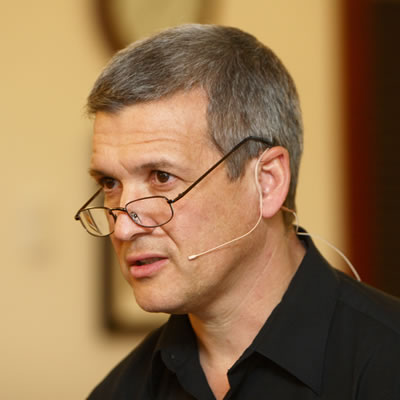
From June 20 through July 31, the Enough Project’s Darfur Dream Team Sister Schools Program is featuring I’m Not Leaving, by Carl Wilkens, as a suggested reading in our Summer Service Challenge. The Summer Service Challenge is an opportunity for students, teachers, and community members in the United States to learn about, raise awareness of, and take action in honor of refugees worldwide.
Carl Wilkens, director of World Outside My Shoes, is the only American citizen who stayed in Rwanda during the 1994 genocide. Throughout the 100-day massacre of 800,000 Tutsis and moderate Hutus, Carl not only stayed in Rwanda to protect friends in his home, but also took actions and risks to protect the lives of hundreds of others. I’m Not Leaving is a collection of Wilkens’ stories chronicling his experience during the genocide and is largely based on cassette tapes and letters he recorded and wrote for his family—his wife and three young children who left Rwanda for Burundi and then Kenya—during that time. The Enough Project interviewed Carl Wilkens about his recently published book I’m Not Leaving and his continued global efforts to encourage activism, particularly among youth, for human rights.
To tell the complete story of the 1994 genocide in Rwanda is impossible. Some parts of the story have already been told, and there are still many parts to be told. This book is an attempt to give the world a look at the people living in Kigali during this extraordinarily brutal and violent time, a look through the eyes of a young American who was living there with his wife and small children – a look through my eyes.
While the stories written here happened during the genocide, this book is not about genocide. It is about choices people made, actions people took, courage people showed, and sacrifices people gave in the face of genocide.
-Carl Wilkens in I’m Not Leaving
Throughout your book, you mention the power of relationships and working together. How did your relationships in Rwanda help keep you alive, or threaten your safety, during the genocide?
Wilkens: Look for an ally. In every crisis look for an ally. For me, allies often came in the form of unexpected people—anyone from members of a killing squad helping to transport the orphans’ belongings to leaders of the genocide co-operating to stop a massacre. If we don't believe that the ability to make one good choice lives in every single person, no matter what terrible things they may have done, we very well might dismiss some of our most effective allies.
You often refer to the power of stories, and how this power helped you in multiple dangerous situations throughout the genocide. Did your appreciation for stories inspire your book? What else inspired you to share and publish your story?
Wilkens: I've always loved stories, but writing this book was driven by request from students, genocide educators, and genocide survivors. Its completion has also brought a great relief now that the stories are in writing and available to share with a wider audience. As one of a handful of foreign witnesses to the genocide in Rwanda, I'm extremely grounded in my belief that everyone should know what happened, and more importantly, that it could have been stopped.
You now tour the globe year-round, sharing your incredible story with thousands of youth and other groups and helping them to tell their own stories. What makes storytelling so important for the human rights movement?
Wilkens: There is no doubt in my mind that stories inspire service and service empowers stories. Stories move us in ways that nothing else can; but knowing and sharing stories is not enough. We have to do something in response: service. If we aren’t moved to service by the stories we hear and share, something wonderful begins to shrivel up inside of us. And without stories, our service often becomes meaningless, cold, ineffective drudgery.
What do you hope readers, especially youth, will take away from reading I’m Not Leaving and learning about your experience?
Wilkens: We are not defined by what we don't have, but instead by what we do with whatever we do have. Anybody could do what my wife and I did! It's about choices, relationships, and the discovery that stories are the most powerful weapon we own. My hope is that these stories will connect in a way that will move each of us deeper in our commitment to end genocide
To order a copy of I’m Not Leaving, please visit: http://worldoutsidemyshoes.org/im-not-leaving-book
Inspired to read I’m Not Leaving? By doing so, you can earn up to 95 points in Darfur Dream Team Sister Schools Program’s Summer Service Challenge. Sign up to participate in the SSC today!
Photo: Carl Wilkens

